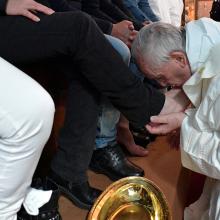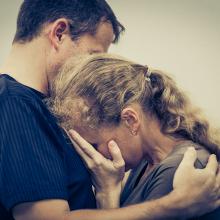inmates
Since his election in 2013, Francis has several times called for an worldwide ban on capital punishment, prompting criticism from Church conservatives, particularly in the United States.
"We are all sinners. We all have defects," the pope told the inmates, in an improvised sermon broadcast by Vatican Radio.
By washing their feet, Francis told them, he was willing to do "the work of a slave in order to sow love among us". He urged them to help each other.
Two of the 12 are serving life sentences, and the others are due to be released between 2019 and 2073.
The Forgiveness
By Steven
I forgive my dad for walking out on his only son
I forgive the people who think they get over
When they assume that I’m dumb
I forgive life for dealing me this hand
I forgive my inner boy for not becoming a man
I forgive the man who bumped me
Because he couldn’t see
I forgive ...
But I can’t forgive everything
Because I’ve yet to forgive me ...
Steven is an active member of the Free Minds Book Club.
CRIMINAL JUSTICE REFORM in the United States is gaining momentum with each graphic video showing fatal police abuse. In the aftermath of the many deaths of unarmed black men and women and the city-wide protests that erupted in Ferguson, Baltimore, and Cleveland, it is not surprising that presidential hopefuls are making bold public statements about the need to change a system that is profoundly unjust, overly punitive, and excessively costly to run.
At the other end of the spectrum, away from TV cameras and political wrangling, activists such as Tara Libert and Kelli Taylor, co-founders of the Free Minds Book Club and Writing Workshop, are dealing with decades of draconian anti-crime policies that have resulted in mass incarceration rates marked by racial disparities that have had a devastating impact on families and communities.
The numbers speak for themselves. Although the United States makes up less than 5 percent of the world’s population, it has nearly 25 percent of its prison population. According to The Sentencing Project, a research and advocacy organization working to reform the U.S. criminal justice system, more than 2.2 million Americans are now locked up in prisons and jails across the country—a 500-percent increase over the past 30 years. Furthermore, those who are incarcerated come largely from the most disadvantaged segments of the population.
THREE DECADES AGO I did a four-year stint behind bars. I wasn’t incarcerated—I worked as a correctional officer at the maximum security jail for the Pinellas County Sheriff’s Office in Clearwater, Fla. It wasn’t a career I planned on pursuing.
After high school, I couldn’t afford higher education. I earned an associate’s degree from the local community college, working initially at a video game arcade, then at a factory my dad owned. At the time, I was thinking about a career in law, so my mother and stepfather, both of whom were patrol deputies, suggested that I apply for a job at local law enforcement agencies in order to pay my way through school; the sheriff’s department where they worked ended up hiring me. That’s how I earned my bachelor’s degree while working full time as one of the youngest correctional officers at the jail.
During the semesters I worked the night shift at the jail, I took classes during the day; when I worked the day shift, I took night classes. The contrast between the classrooms and the battleship gray corridors lined with steel-barred cells was striking. At the time, I did not like the jail job; I couldn’t wait until I could “escape” to graduate school.
“We cannot endure even to see a man put to death, though justly…We, deeming that to see a man put to death is as much the same as killing him” (Athenagoras of Athens, a Christian philosopher writing a defense of Christianity, speaking against state-sponsored killings and abortions, around 177 A.D.)
I am not sure where it originated, but somewhere someone started a rumor that if you are against the death penalty then you are soft on crime and care more about the guilty than the victim. Nothing could be farther from the truth!
Through marriage, a close relative of mine was murdered. I officiated the funeral. I attempted to comfort my family. I know the pain and evil of murder. I also know the pain and evil of a justice system that freed the killer after a few short years behind bars.
As a minister, and more importantly as a follower of Jesus, I take his words about visiting prisoners seriously (Matthew 25:36). I believe in forgiveness and grace and mercy. I believe in the Great Commandment (Matthew 22:34-40). I also realize you don’t get placed on death row for being a boy scout. People do need to pay for their crimes. The more serious the crime, the more serious the penalty. But ultimately, as a follower of Jesus, I believe in reconciliation. I believe in redemption. I believe no one is outside the realm of God’s mercy and grace.
Inmates in British Columbia have filed suit to overturn a decision by the Canadian government to cut part-time prison chaplains, alleging that the policy has nearly eliminated prison ministry to minority faiths.
“Prisoners do not lose their right to freely express their religious and spiritual beliefs by virtue of their incarceration,” said the lawsuit, which asks the court to declare the policy a violation of Canada’s Charter of Rights and to reinstate minority faith chaplains in British Columbia.
The suit was triggered by Ottawa’s announcement last October that it was canceling the contracts of all part-time prison chaplains to save an estimated $1.3 million. The non-Christian chaplains ministered to Muslim, Sikh, Jewish, and Buddhist inmates, and those who follow aboriginal spirituality.
In 2010, Hope House DC received a grant from the Humanities Council of Washington, D.C. to support participation in the National Endowment for the Arts' Big Read project. Hope House placed about 100 copies of Earnest J. Gaines' classic A Lesson Before Dying in two prisons that have high concentrations of District of Columbia inmates.
A white woman is raped by a black man in North Carolina. During the assault, she studies his face, determined to bring him to justice. She later identifies a suspect both in photos and in-person line-ups. Only she's wrong.




